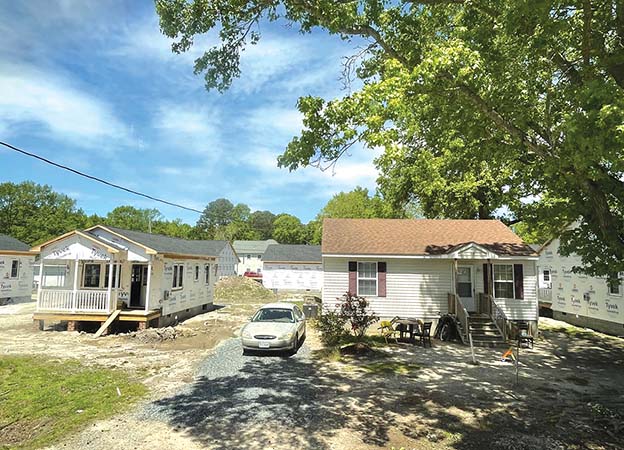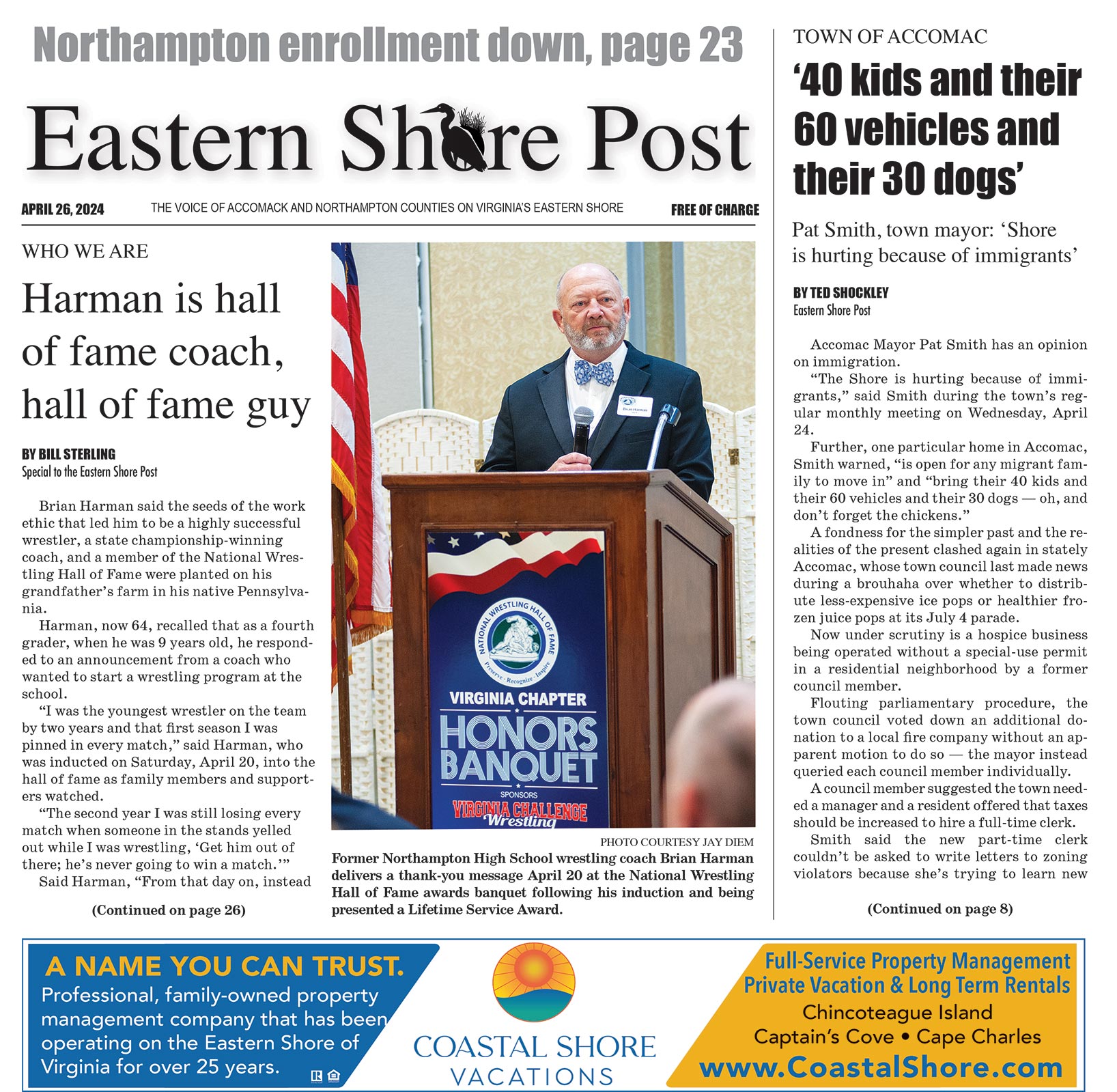
By Stefanie Jackson – Congresswoman Elaine Luria on Monday hosted a bus tour of Eastern Shore places and communities that need affordable and workforce housing and are ready for redevelopment, with her guests including local concerned citizens, real estate and planning professionals, town and county administrators, and state funding partners.
Each destination on the tour had its own story, told by the people who live and work on the Shore, reflecting on its history and anticipating its future.
Horntown
A large gathering of Horntown citizens welcomed the guests and discussed what is needed to restore their town. Horntown lacks not only housing but amenities such as lighting, sidewalks, and a park or playground for the children, said Lynelle Johnson.
Horntown is looking to draw in small businesses such as a laundromat and a convenience store; the latter is especially needed since the community is susceptible to flooding, which prevents residents from venturing out past Fleming Road to buy essentials, Johnson said.
She also would like the town to have its own marquee. There’s a large sign in town pointing the way to the Chincoteague Bay Trails End Campground, yet there’s no sign for Horntown.
Horntown once was home to a few small businesses and had some outdoor lighting, but “we’ve been forgotten … we shouldn’t be living like this,” said Carolyn Handy.
The town does have at least one small business in an adaptive reuse building: the Agape preschool in the former Horntown Methodist Episcopal Church, originally built in 1859 and rebuilt in 1892.
Blanford Persinger said Horntown needs more police presence to curb speeding through the area and to check on residents. Its citizens also want better job opportunities for themselves and their children, “something more than Tyson and Holly Farms,” he said.
Horntown, which is close to Chincoteague, Wallops Island, New Church, and the Maryland border, is the place to build up – it’s the “center of everything” in upper Accomack County, Valerie Shrieves said.
Ava Gabrielle-Wise, a guest on the tour, said Horntown is full of concerned citizens who are “ripe to do the same thing” as Exmore’s New Road community, whose members formed an organization in the 1990s and bought 30 acres, sold it back to themselves, rebuilt the community, and successfully fought for the elimination of substandard living conditions.
Bayside
Another group of concerned citizens taking a page from New Road’s playbook are from Onancock’s Bayside community, another destination on the tour.
Like Horntown, the Bayside community once thrived with its own identity and small businesses. The community had a baseball field and a team of players known as the “Bayside Sluggers,” and there were two churches, a schoolhouse, a beauty parlor, a barber shop, and a seafood plant that is now abandoned and prime for redevelopment, said Myra Riley Taylor.
The community consists of about 150 privately owned lots, and about one-third have occupied homes. There are about 37 abandoned homes, 26 vacant cleared lots, and 28 vacant wooded lots.
Most households have at least one family member who is elderly or disabled. The majority of the community members are single, high school graduates, and employed or retired.
Benefits of the Bayside community include broadband internet access and drainage ditches recently dug deeper by the Virginia Department of Transportation to mitigate flooding.
Challenges include failing septic systems; the Bayside community would benefit from a future expansion of the Hampton Roads Sanitation District.
The Bayside community’s revitalization team was formed in 2018. So far, all of its funding has stemmed from its board of directors, but the team is exploring possible options for state and federal funding.
Mary N. Smith Cultural Enrichment Center
Mary N. Smith High School opened in 1953 in Accomac; it was a high school for Black students and was named in honor of local educator Mary Nottingham Smith.
After segregation ended, the school became Mary N. Smith Middle School, which was one of three Accomack County middle schools that closed in 2004 to prepare for two brand-new middle schools to open that fall.
Accomack County turned over the former school to the Mary N. Smith Alumni Association in 2011, and the building became the Mary N. Smith Cultural Enrichment Center, yet another destination on Monday’s bus tour.
The first floor of the building is currently used to host meetings of local organizations and the Eastern Shore Boys and Girls Club, but Mary N. Smith alumni have more in mind for the building, including housing.
Karen Downing said housing could go on the first floor of the former school, or there could be businesses on the first floor and apartments on the second floor. The property includes 15 acres surrounding the school, she added.
The alumni association worked with Ramona Chapman, of the Virginia Department of Housing and Community Development, to obtain a $10,000 pre-planning grant; now the group is working toward a $50,000 grant for an engineering study.
Whispering Pines
The Whispering Pines Motel and restaurant in Tasley, a property that dated back as far as the 1930s, was a frequent stop for travelers on U.S. Route 13 for decades.
Rich Morrison, Accomack’s deputy county administrator, noted the property remained popular throughout the 1950s and 1960s but became rundown in the 1970s and 1980s; then it was destroyed by an arsonist’s blaze in 2013.
The property, now owned by Accomack County, has been cleaned up, and the land is flat and ready and waiting to be developed, a total of six acres, he said.
The Hampton Roads Sanitation District will build a sewer force main that will pass the former Whispering Pines site, then turn and cross the highway toward the town of Accomac.
Morrison noted there must be a group of at least 25 homes in one particular area before a collection system can be built for them to connect to the force main and use the sewer system.
He added that there are also opportunities in Accomack County for in-fill development in unfinished subdivisions, which include Nock’s Landing and Wishart’s Point.
New Road
Ava Gabrielle-Wise, executive director of the New Road Community Development Group, said Exmore’s New Road community is more than 100 years old, stemming back to the times of sharecroppers and tenant farmers in a post-Civil War era.
Fast-forward to the 20th century and the historically Black community was contending with absentee landlords and substandard living conditions. Other neighborhoods had indoor plumbing, but New Road was left behind.
Gabrielle-Wise was an approximately fourth-generation member of New Road and grew up in the community. Her mother is the late Ruth Wise, the original executive director of the New Road development group.
New Road attempted to get a 100% subsidized sewer system in the early 1970s but was denied; the community pursued a 75% subsidized sewer system in the early 1990s but was again denied.
The community appealed to Exmore to extend its sewer service to New Road, and after three years, the town finally agreed. About halfway through the process, New Road decided acquire part of its neighborhood, Gabrielle-Wise said.
In 1994, the New Road Community Development Group was formed and received a $360,000 grant from the McAuley Institute to purchase 30 acres.
The members of New Road started selling the land back to themselves and began an empowering tradition that continues today, with most residents of New Road owning their homes.
Currently underway is New Road’s three-phase Legacy Project, which aims to build housing on the remaining undeveloped parts of the original 30 acres.
Phase 1 is the construction of six single-family homes; Phase 2 will include eight duplexes and a three-story building for multi-family housing, which may be mixed use with commercial space downstairs and residential space upstairs; Phase 3 is still in its conceptual phase but may include 12 units of senior housing.
The contractor for the Legacy Project is RMT Construction; subcontractors and tradesmen interested in working on the project should contact Robert Skipper at 804-464-2673 and may visit https://rmt-construction.com/ for more information.
Exmore
Northampton County Administrator Charlie Kolakowski said there’s “lots of potential” for redevelopment in Exmore, especially when the new sewer system is in place. Exmore is replacing and expanding its entire collection system, and the town will connect to force main to be built by the Hampton Roads Sanitation District.
Exmore Director of Utilities Taylor Dukes said the town sewer system currently serves about 350 customers, but the new collection system will have about 830 connections.
A groundbreaking for the collection system is expected to take place this summer or fall.
Dukes also pointed out Exmore has a new well system and currently pumps 120,000 gallons of water a day; it is permitted to pump up to 160,000 gallons per day and may apply to have that increased.
There are plenty of buildings on Main Street and throughout town that have potential for both commercial and residential redevelopment.
Nassawadox
As the tour bus drove through Nassawadox on Hospital Avenue, Kolakowski pointed out 32 acres on the east side of the road, which are for sale and zoned commercial/residential.
Mayor Patsy Stith said the town experienced a loss when Riverside Shore Memorial Hospital and several doctors’ offices moved to Onancock a few years ago, but there is potential for redevelopment.
The six-story former hospital building could be converted into apartments, and the empty doctors’ offices could be converted into workforce housing for teachers, she suggested.
One benefit of building in Nassawadox is the sewer system on Hospital Avenue that served the hospital and other facilities on the street.
Kolakowski said the town will be the southern terminus for the sewer force main that will be built by the Hampton Roads Sanitation District, which also will run the existing sewer system.
He noted there has been an explosion of economic growth in Cape Charles in the last five years, driving up housing demand, and practically guaranteed developers that any homes they build nearby, including in Cheriton and Eastville, will be sold.


